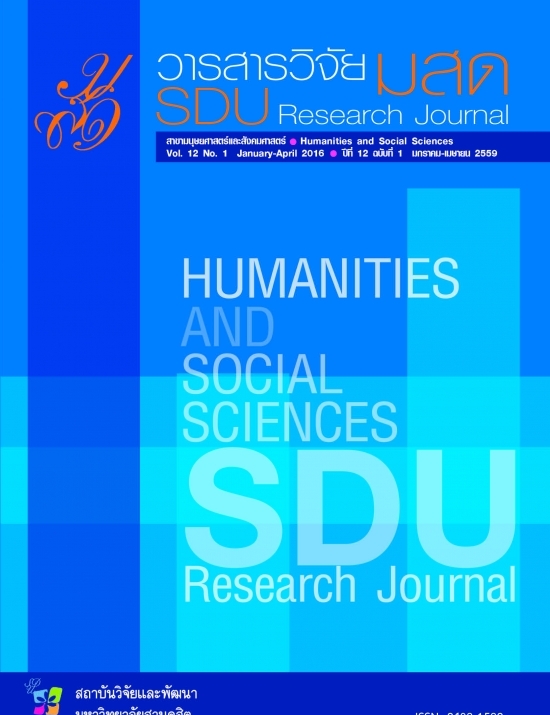แนวทางในการจัดการความรู้โดยใช้เครือข่ายแหล่งการเรียนรู้ชุมชน ตำบลโคกโคเฒ่า อำเภอเมือง จังหวัดสุพรรณบุรี
Keywords:
knowledge management, learning sources, learning networks, lifelong learningAbstract
This research is aimed mainly to propose the exploration of learning sources and
community learning networks, and to recommend practical guidelines to knowledge
management (KM) for lifelong learning using learning networks in the Khokkotao
sub-district. The participatory action research and qualitative research were used.
The SWOT analysis, content analysis, and statistical evaluation of research activities using
mean and standard deviation were applied for data analysis. The findings revealed 19
learning sources existing in Khokkotao. Community learning activities focusing on work and
career to raise the household incomes have been organized continuously. There were
sharing and transferring knowledge from the older to younger community members
however no technology was used for KM processing. The network within Khokkotao was in
the form of social relations of Thai rural community with groups combined voluntarily by
kinships. The relationships between occupational groups and villages to cooperate favored
the exchange network, communication network, and network of coexistence relationships.
The external networks were accomplished by community development networks
communicating through communities by local leaders. The KM vision proposed by
participants was “Khokkotao communities have harmony, happiness, strength, and better
life quality”. The guidelines recommended for community KM using learning networks for
lifelong learning are of 4 parts: 1) Developing team works for community KM networks,
2) Developing community learning resources, 3) Developing a KM system and 4) Creating a
learning society to be “The learning community”.
References
the Coordinating Operation Center for Network of Community Organizations.
Bangkok: Office of Extension and Community Development, Community
Development Department. (in Thai)
Gulasirima, R. et al. (2011). Management Model of Community Learning Center in
Khokkotao Subdistrict, Muang District, Suphanburi Province. Bangkok: Suan Dusit
Rajabhat University. (in Thai)
Office of the Education Council. (2009). The Proposal of Education Reform in the Second
Decade (2552-2561 BC). Bangkok: Bureau of Lifelong Learning and Educational
Opportunities. (in Thai)
______. (2010). Guidelines for Developing Non-formal and Informal Educational Policies to
Build the Learning Society Based Sufficiency Economy Philosophy and Thai
wisdom. Nonthaburi: The Agricultural Co-operative Federation of Thailand.
(in Thai)
Panich, W. (2006). Knowledge Management for Practitioners. 3rd ed. Bangkok: Sukpajai.
(in Thai)
Phasukyeud, P. (2006). Knowledge Management. Bangkok: Yaimai Creative Group. (in Thai)
Sibmeunpiam, N. (2005). Development of a Learning City Model: A Case Study of the
Sub-district Administrative Organizations in Chonburi Province. (Doctoral’ s
dissertation). Chulalongkorn University, Bangkok. (in Thai)
Suwansak, N. (2008). Learning Center Development. Retrieved October 27, 2009, from
http://www.codi.or. th/index.php. (in Thai)







